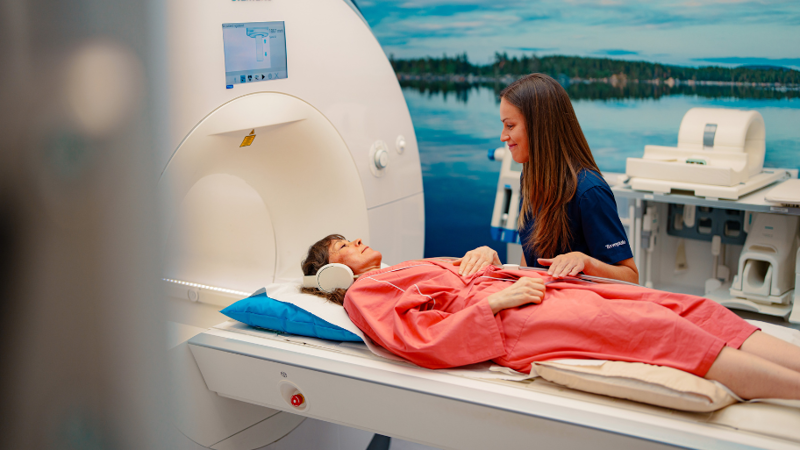Mental health-related sickness absences finally started to decrease - Terveystalo commits to an ambitious target for 2025
In Finland, it is estimated that up to 7 million working days are lost each year due to mental health-related sick leave. Not only can mental health challenges, if chronic, lead to unnecessary premature exclusion from working life, but the situation is also unsustainable for Finland's vitality and national economy. Recent data from Terveystalo show that timely and appropriate interventions have reduced the duration of mental health-related absenteeism and brought it down for the first time in a decade. This significant turnaround gives hope that the mental health crisis can be prevented, but it will require a concerted effort by all concerned.

Terveystalo´s data shows that the total number of mental health-related absences of occupational health clients has remained relatively stable throughout the 2020s.
– Through timely and appropriate interventions, we have succeeded year on year in reducing the duration of sickness absence for our occupational health clients and shifting the focus from long to short absences. During 2024, we finally reached a situation where the relative total number of mental health-related absences of our occupational health customers turned down for the first time," says Silja Komulainen, Chief Medical Officer of Occupational Health at Terveystalo.
Mental health-related sickness absence in Finland has been on the rise for several years so far, so although this is a 1% change from 2023 to 2024, the result marks a significant turning point.
– According to the WHO, the mental health crisis is becoming the next pandemic. Our recent findings show that we have a chance of avoiding a pandemic, but it will require action on mental wellbeing by all. In healthcare alone, we cannot solve the problem, as mental health challenges are increasingly common and the strain stems from work, home and a combination of both. At Terveystalo, we want to further accelerate the pace of decline in mental health-related absenteeism and are committed to achieving a 5% reduction in national mental health-related sickness absence in our current customer base by 2025. If we succeed, we will achieve around 80 000 healthy working days, which equates to an estimated saving of EUR 35 million for our customers," says Komulainen.
It does not matter where the distress is originated, the mind does not discriminate
Sickness absence is just the tip of the iceberg when it comes to the impact of mental disorders on organisational productivity and competitiveness. Data from the National Institute of Health shows that the number of mental disorders underlying long-term absenteeism continued to fall in 2024, but at the same time the number of diagnoses of neurotic disorders and anxiety disorders has increased. This means that more and more people in work are experiencing mental distress.
– Whether or not the distress is work-related, it has a holistic impact on life. From the employer's perspective, productivity suffers because when stressed it is difficult to concentrate on work, there is no recovery and the person becomes tired. This makes it difficult to grasp the big picture and absorb new things. When tired, making decisions feels impossible and starting work is delayed," says Komulainen.
– Work itself is one of the biggest contributors to health. If work capacity is reduced due to stress, temporary changes can be made to the workplace to allow people to do other work. There are solutions, as long as we think about them together," Komulainen concludes.
Read more occupational health articles

How technology helps relieve mental stress: "When the load is high, the threshold must be low."
Mental health disorders have overtaken musculoskeletal disorders, which had long been the leading cause of sick leave. Work is changing, and the range of sick leave caused by mental health issues has also changed. We must be able to offer new solutions to this challenge.

Extensive data set of 200,000 samples: Nightingale study reveals link between illness risks and sick leave
Data from the Finnish Nightingale study, which is used in Terveystalo's occupational health services, reveals a clear link between lifestyle-related health risks and sick leave. The exceptionally extensive data set of over 200,000 customers shows that people with a low risk of illness had significantly fewer absences, while those in high-risk groups had more absences. The results highlight the importance of preventive healthcare in ensuring work ability and the competitiveness of companies.

Strong identification speeds up your service experience when calling us
Soon you can identify yourself easily and securely before your call is answered. Read below to see how the identification process works.

Terveystalo's digital services have been awarded the internationally recognized ISO27001 information security certification.
Terveystalo's information security practices, processes, and risk management are in line with international best practices.

Does massage help relieve stress? – Touch restores and calms the body and mind
Stress is not always visible on the outside, but the body does show signs when the strain increases. According to Lassi Ylönen, a trained massage therapist at Terveystalo Rela, the body often communicates stress through subtle signs.

Circular economy and artificial intelligence boost performance and improve care
At the heart of sustainable healthcare, technology serves as a tool for improving both the quality of care and accountability. Terveystalo favors solutions that combine sustainability, cost-effectiveness, and medical expertise.